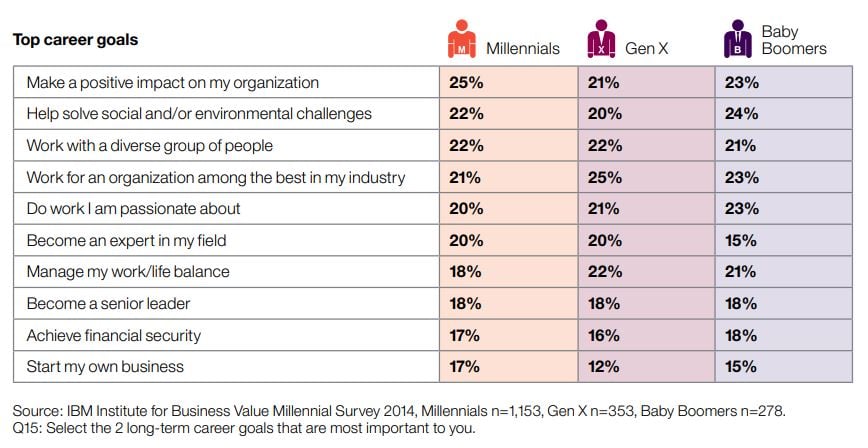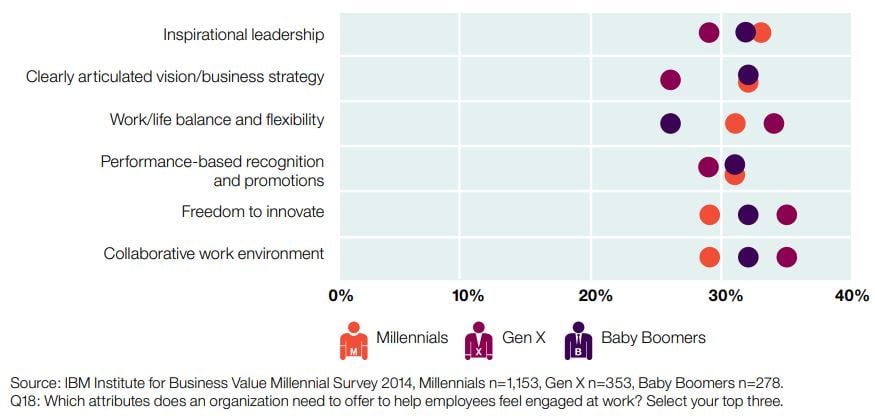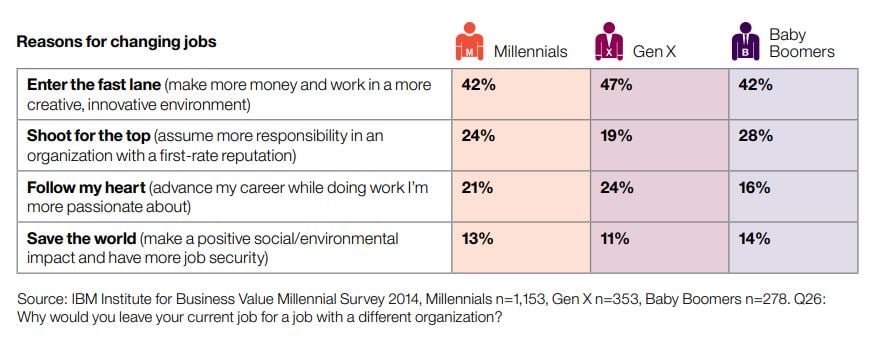
Generational diversity at work: how different are Millennials?
By: John Whitehead

For the first time in history, three distinct generations are working side-by-side in the workplace – Baby Boomers, Generation X and Millennials.
However, it's millennials that are the focus of employers and hiring managers. They are highly sought after for their digital, innovative and creative abilities – something many employers believe older generations lack.
In fact, 38% of the total US workforce is made up of millennials, according to Gallup. This shows how dominant millennials are with regards to entering the workforce and subsequently taking over leadership roles. On the flip side, 53% of employers say it is difficult to find and retain millennials, according to Upwork.
How different are millennials anyway?
So, if it’s so hard to retain millennials, what key differences are employers seeing or not seeing? And if the older generations are happier to stay in a role for longer, should we not re-look at the benefits of hiring Baby Boomers and Gen Y’s at the same rate that we hire millennials?
Before we do that, let’s take a sneak-peak through the lens of each generation’s upbringing and the major influences that moulded their outlook on jobs.
Generational makeup
-
Baby Boomers (born between 1946 and 1960): The Baby Boomers have witnessed several major civil rights movements, the Vietnam War and the introduction of nuclear weapons. They value education, adapt easily to change and have compassion for social values and issues.
-
Generation X (Born between 1961 and 1979): The state of the local and global economy during this period resulted in Gen Xers emerging as self-reliant people with a yearning for job and financial security. Gen X also witnessed the exciting expansion of telecommunications, space programs and the birth of the software and IT industry.
-
Millennials (born between 1980 - 1995): The biggest difference between millennials and older generations is that they have a deep understanding of digital technology. Otherwise known as Generation Y, they are used to being connected to people online 24/7, have a strong desire for financial success, independence and want everything to happen now.
As a result of living through different influences, each generation has a slightly different outlook on things but when it comes down to it, young and old workers have remarkably similar career goals, work attitudes, and learning patterns.
Debunking the generational myths
There are so many myths and stereotypes around the three generations, including what they look for in a job and workplace and what their career goals look like.
But believe it or not, millennials have similar career goals to those of other generations. The below charts are from an interesting study conducted by IBM that aimed to dispel myths around the three generations.

As well as having the same career goals, the three generations also want similar things in a workplace. Like Baby Boomers, millennials want an inspirational leader at the head of the team, they love when a company has a strong business strategy and appreciate performance-based recognition and promotions. The results also show that millennials place less emphasis on a collaborative work environment, the freedom to innovate and the flexibility to manage their work/life balance compared to Gen X employees, but the differences are minimal.

No question about it, millennials have better digital skills compared to older generations, but this doesn’t mean they want to do everything virtually. With regards to learning new skills and tools that will increase their performance at work, millennials prefer face-to-face contact. They are however, more comfortable with virtual learning than their older colleagues: 35% are happy to use self-paced interactive modules, apps or online simulations, compared to 33% of Gen X and 30% of Baby Boomers.
A recent study published by McCrindle recently said that millennials will change careers 15 times throughout their life. But not many employers realise that when millennials change jobs, they do so for the same reasons as Gen X and Baby Boomers. The IBM study even reveals there are no overwhelming generational differences (see below).

The benefits of generational diversity
37% of global employers and hiring managers are striving for better diversity among their teams, according to a LinkedIn Global Recruiting Trends Report. This is great news considering multi-generation decision teams have more than twice as many positive outcomes (Forbes, 2018).
In fact, decision-making teams with a “wide” age range of 25 years or more from youngest to oldest team member met or exceeded expectations 73% of the time, while those with a “narrow” range of less than 10 years did so only 35% of the time according to the Forbes study.
That’s just one example of why a multi-generational team is great for businesses to foster, there are many more!
Fostering a collaborative workplace
By 2030, millennials will be 75% of the global workforce, according to IBM. But employers need to remember that older generations offer just as many qualities as millennials and everyone is striving for similar career goals.
Thus, it’s important to encourage a collaborative environment in every workplace and most importantly, remember that managing a multi-generational workforce consists of seeing people as individuals, not generational stereotypes.
Speak to Six Degrees Executive to learn how more diversity could benefit your team.
Related


Stay ahead of the EOY crunch with contracting
Even though December comes around the same time every year, somehow it still manages to hit us with...
.jpg?width=352&name=FMCG%20Sales%20-%20Blog%20(3).jpg)
FMCG Sales: 2025 Trends & Hiring Challenges
In a market defined by consolidation, and caution, FMCG Sales leaders are facing increased pressure...

 Accessibility
Accessibility
